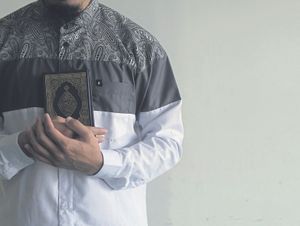I was born in the West Midlands but my family is from South Asia. I always thought that to be Asian was to be Sikh, Hindu, Buddhist, or Muslim – and that to be anything else would be following Western ideas.
Nearly everyone at my local school was Muslim. However, they fell into two rival groups: Bengali and Pakistani. Even though both groups were Muslim and supposed to show love and harmony, deep down there was division and resentment. This was due to differences in language, culture, food, appearance, and other areas.
At that time, people who were non-Muslim, Jewish, or white were often mocked and looked down upon. Things may have improved over the years, but this was my experience during my schooling.
No questioning allowed
I was raised in Islam through the influence of family, friends, the local mosques, and the Asian community.
I had to accept Islam without question and thought that leaving Islam would send me to hell. Practising Islam was simply our way of life and what I was expected to do. Deciding for myself was not an option.
However, I was soon dissatisfied and longed for something more. I thought that doing good or becoming more zealous for Islam would help, but inwardly I still felt unfulfilled and restless.
Something different
Over many years my family had received practical help from a Christian lady. She was friendly and loving, even though she was from a very different cultural background.
Over time, I made other Christian friends and I noticed that there was something different about them. They seemed to have a deep sense of peace and love in their hearts which I didn’t understand but longed to experience myself.
These Christians shared the good news of the Bible with me on many occasions, but I deliberately switched off and didn’t take in the message.
I was even invited to go to a church group (even though they knew I was a Muslim). At the end of the meeting, someone shared the message of Jesus, but again I didn’t listen.
At one meeting, an Asian man who had been a Hindu spoke about how he became a Christian. He explained that merely following a religion didn’t satisfy the longings of his soul. He had read through the Qur’an, but that didn’t help. Only when he came to know Jesus Christ was his soul satisfied.
I was surprised to hear this Asian man talking about becoming a Christian. I was brought up thinking that only white people were Christians. This caused me to start thinking about whether I had been taught correctly.
I also began considering whether the Bible had really been changed or corrupted, as has been taught and accepted by Muslims.
Love and concern
I met another Christian who also showed me love and concern. Over time, he told me what he believed. Straightaway I sensed that he was trying to convert me to his religion and so I switched off again.
I also started to spend less time with him. I was taught by my family and the Muslim community that Christians were immoral. I was told that everything you see on the media is typical of Christians.
But when I met genuine, born-again Christians, I found them to be nice people seeking to live good, moral lives.
Thinking carefully
I kept thinking about the Christians I had met and what they believed. My mind was not at rest and I felt compelled to find the truth. I needed to find out more, so I went back to my Christian friend and started to attend his church.
As I listened to the preaching over several months, it felt as if the preacher was picking on me when he talked about sin. I learned that the Bible speaks with great authority and understanding about mankind and sin. I learned that sin is not just clearly wicked deeds but includes everything (great and small) that we do wrong
The Bible is clear that God is holy and pure and hates all wrongdoing. To not punish a crime means he has let us get away with it. Therefore, it is right that every wrongdoing is punished.
But God loves us and wants to spare us from his wrath. This is a dilemma: God wants to spare us, but he must punish our wrongdoing. What is the solution?
A genuine solution
The Bible offers a genuine solution for us. Jesus came into the world and led a sinless life. He then let himself be put to death on a cross in order to receive the punishment from God that we deserve. This means that God has punished our sin but can also spare us the punishment.
Learning these things, I realised that my heart was not right with God and therefore I was heading for hell when I die.
At the same time, I knew of God’s solution. I knew that I needed to receive it for myself.
After talking with a friend and thinking about these things, I went to my house and prayed that God would come into my life and forgive me for my sins through Jesus’s death on the cross.
After I prayed, I felt something of God’s presence coming into my heart, which satisfied the longings in my soul. I had a sense of assurance that God had accepted and forgiven me.
Since then, I have continued to have a sense of assurance that I am right with God and that I have been born again.
I realised that it is not enough to just follow a religion, because religion does not deal with the problem of our hearts. Jesus’s death on the cross is the only genuine solution for us, but we need to accept it for ourselves.
God has changed my life and is changing many people’s lives through Jesus’s death. What is your state before God?
Akik Miah








